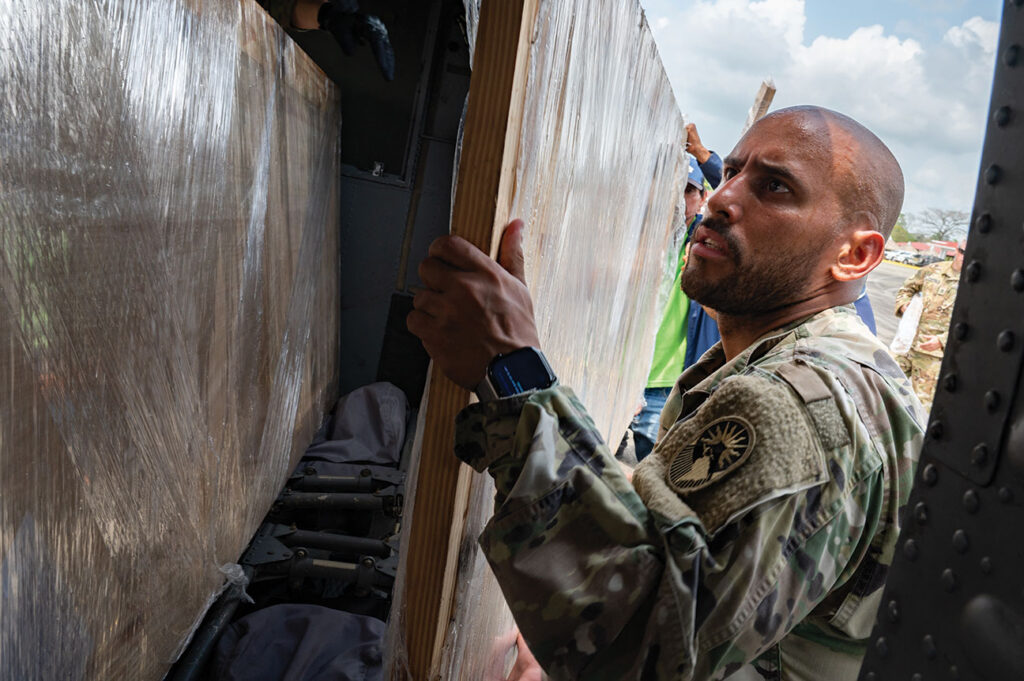U.S. Army Sgt. Brian Vazquez loads construction materials onto a Black Hawk helicopter during PANAMAX-Alpha in Panama. STAFF SGT. TRISTAN BIESE/U.S. AIR FORCE
The Western Hemisphere Institute for Security Cooperation (WHINSEC) plays a vital and growing role in homeland defense through its partnerships and support in security cooperation activities. The institute’s ties with academic, joint, interagency and international entities and nongovernmental organizations (NGO) facilitate training, combined exercises, conferences, subject matter expert exchanges and other interactions to advance homeland defense.
WHINSEC’s academic partnerships contribute to homeland defense and collective security through specialized educational tracks and degrees for students, continuing education opportunities for faculty, and guest speaker seminars and research collaboration. Since its establishment at Fort Benning, Georgia, in 2001, WHINSEC has trained and educated more than 24,000 students from 36 countries representing the military, law enforcement and civilian sectors. Its students and faculty have earned 219 graduate degrees — 141 through civilian university partnerships and 78 Master of Military Arts and Science degrees through the Command and General Staff College of Fort Leavenworth, Kansas. In resident courses that include partner nation and U.S. students, curricula emphasize important security themes. Recent student articles and master’s theses have addressed irregular migration, security of maritime commercial routes, great power competition and other topics.
Activities with joint and interagency partners and security forces of other countries also promote homeland defense and hemispheric security. Subject matter expert exchanges involving WHINSEC faculty promote operational compatibility, such as an exchange in coordination with U.S. Army North focused on noncommissioned officer development with partners in Puebla, Mexico. The institute’s interagency partnerships include the Department of State, Department of Homeland Security, FBI and others. These partnerships also have strengthened WHINSEC’s ability to promote civil-military relations and whole-of-government approaches to regional security challenges.

Collaboration enhancing homeland defense and hemispheric security, however, is perhaps best exemplified in the strong partnership between WHINSEC and the government of Panama during the PANAMAX-Alpha exercise. PMX A, a bilateral exercise with Panama supported by U.S. Southern Command, brings together military personnel, law enforcement officials and civilian experts to practice and refine their skills in responding to various security scenarios. This partnership, built on mutual benefit, combines WHINSEC’s expertise and resources with Panama’s unique perspective and experience in regional security.
Faculty and staff train and mentor participants, focusing on topics such as counterterrorism, disaster response and humanitarian assistance. “WHINSEC plays a vital role in offering education and training to our partners in the Western Hemisphere. As part of the PANAMAX-Alpha training exercise, we provide academic assistance in the military decision-making process, enabling commanders and their staffs to develop detailed and effective plans,” said Maj. George Chacon, WHINSEC School of Professional Military Education instructor. The partnership between WHINSEC and Panama through PMX A started in 2004. It is a model for future security cooperation between the U.S. and its regional partners.
Finally, WHINSEC champions human rights and democracy through engagements with international organizations and NGOs. WHINSEC has collaborated with the International Committee of the Red Cross on law and human rights. Additionally, graduates of WHINSEC’s Human Rights Instructor course use educational materials produced by the NGO Human Rights First during classroom instruction. The institute has hosted panels with experts who included a human rights advocate at the Washington Office on Latin America to speak on human security issues. Such partnerships have strengthened WHINSEC’s role in security initiatives and scholarship on human rights and democracy, promoting a sustainable approach to security in the Western Hemisphere.
As a premier institute for security cooperation and education, WHINSEC’s partnerships have contributed significantly to homeland defense and hemispheric security. Continued collaboration with academic, joint, interagency, and international entities and NGOs will remain essential to promoting a more peaceful and prosperous Western Hemisphere.

